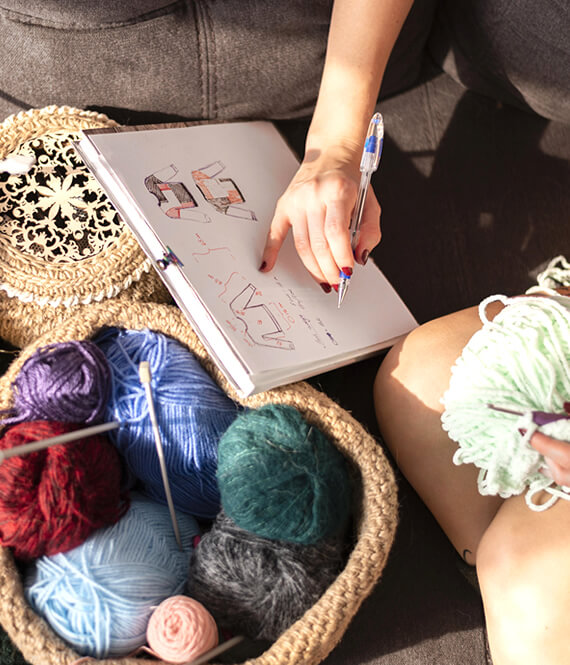
From Neuroplasticity To Mindful “Flow”: Here’s How Hobbies Help To Improve Your Mental Health
We recommend helpful products in our articles. Read our full disclosure here. The content on this website is not intended to be a substitute for professional advice, diagnosis, or treatment.
Enjoying a hobby is beneficial for your mental well-being, which is something many people never consider.
If you’re trying to figure out ways to make your mental health better, you could start by scheduling a therapy session, investing more in self-care, or joining a counseling service.
In conjunction with these practical approaches, enjoying hobbies is a fantastic way to boost your mental wellness too.
Whatever your interests are, finding a nice new hobby to partake in can give you an opportunity to take a step back from life’s stresses, engage your mental and physical health in new ways, enhance your happiness, and boost your sense of accomplishment.
If you find it challenging to choose a hobby, you can think about what are common hobbies that people around you have.
It is easy to pick up a hobby from people with common interests like our close friends or family members.
Now, let’s explore the link between hobbies and mental health in more detail.
Hobbies Promote Neuroplasticity
For more than a century, the concept of neuroplasticity has fascinated scientists and researchers alike.
This groundbreaking theory suggests that our habits and decisions possess the remarkable ability to reshape the intricate wiring of our brains, leading to profound transformations in our lives.
When we embark on forming a new habit, we initiate a process that goes far beyond surface-level changes.
Our brain adapts and creates fresh neural pathways, forging connections that enhance our cognitive capabilities and shape our behaviors.
The vast infrastructure of our nervous system accommodates these changes, allowing for remarkable flexibility and adaptability.
By embracing new hobbies and activities, you introduce a myriad of connections within your brain.
Understanding and harnessing the potential of neuroplasticity can revolutionize the way we approach personal growth and well-being.
By nurturing new hobbies and embracing positive changes, you have the extraordinary capacity to reshape your brain, empowering yourself to live a healthier, more fulfilling life.
Hobbies Reduce Stress
In today’s fast-paced world, stress, tension, and various challenges seem to surround us at every turn.
However, there are proven methods to combat these overwhelming pressures and enhance our overall health and wellness.
Engaging in activities we love can serve as a powerful antidote to stress.
Scientific research reveals fascinating insights into the positive effects of engaging in hobbies that truly captivate us – like pet care!
When we participate in something that sparks our enthusiasm, we unlock a cascade of benefits.
Not only does it elevate our mood, but it also encourages a sense of calmness by regulating our heartbeat and minimizing stress levels.
Incorporating a new hobby into your routine can be the key to unlocking a stress-free, contented life.
Improved Self-Esteem
Delving into hobbies isn’t just about pursuing enjoyable pastimes; it has far-reaching effects on our self-esteem and overall confidence.
When we dedicate ourselves to a hobby, we embark on a journey of self-discovery and skill development.
As we witness our progress and accomplishments over time, our sense of self-worth soars, bolstering our confidence and belief in our capabilities.
You Learn That Failure Is Okay
In the realm of self-improvement, there’s an age-old adage that still holds true: learning from your mistakes is key to personal growth.
While it may sound familiar, its significance cannot be overstated, and it warrants repeating.
You benefit and grow by embracing your mistakes.
Failure, even in a hobby you genuinely enjoy, can be an opportunity to overcome the fear of falling short.
By encountering setbacks and learning from them, you develop resilience, adaptability, and a growth mindset.
Each stumble becomes a stepping stone, propelling you closer to success and self-acceptance
Hobbies Encourage The “Flow”
Engaging in hobbies can be more than just a pleasurable pastime; it can lead you to a state of mindfulness called “flow.”
This state of energetic concentration and complete immersion in an activity has been shown to offer a multitude of benefits that positively impact your overall well-being.
The state of flow – a kind of meditative activity – offers a myriad of advantages that go beyond the immediate enjoyment of your chosen activity.
Studies have shown that engaging in flow-inducing hobbies can enhance your creativity, enabling you to think outside the box and unlock new perspectives.
Additionally, this state of focused immersion promotes emotional control, allowing you to manage stress and navigate challenging situations with greater resilience.
Flow also brings forth a surge of positive emotions, fostering a sense of joy, accomplishment, and fulfillment.
Conclusion
Hobbies should help you to unwind.
Thus, they shouldn’t add another task to your list of to-dos.
Choose hobbies you consciously and gleefully decide to do to benefit from them in a multitude of ways and improve your mental health with their help.
You never know what you might learn about yourself from your hobbies!
"We love to research problems, examine studies, analyze solutions, and share with you ideas that make life healthier. You can learn about us and our editorial standards here. Have suggestions or feedback to share? Send us a message!."













Leave a Comment